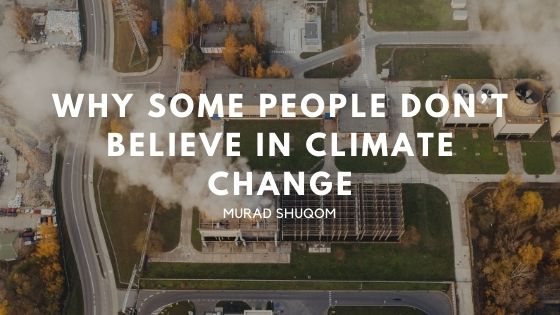There are always going to be people who doubt scientific facts, and this is especially true of climate change deniers. The sad truth is that by admitting climate change is a legitimate problem, people have to acknowledge that the world is changing in ways that are both our fault as humanity and that are nearly out of our control to change. Whether it rubs against our worldview the wrong way, it disrupts the way we live presently, it could result in an unfavorable societal response, or any other reason, climate change becomes an inconvenient truth and is much easier to ignore than live with the reality and act upon the worries that come with the issue at hand.
The Negation of Reality
Living in denial was something that was actively chronicled by famed psychologist Sigmund Freud and his daughter, Anna. Freud described the negation of reality as a mental process that is “a way of taking cognizance of what is repressed.” This is the difference between denial and ignorance: to deny the existence of climate change is to take a glimpse of the reality we now face, then defend yourself against said reality.
Social psychologists look at this in another light—motivated reasoning. Rather than accepting the facts of climate change as they are, people see science conflicting with their believes and values and take up a defensive stance against them to protect their worldview. Social psychologist Jonathan Haidt describes it as people taking on the position of a defense lawyer clutching to and defending their initial gut instincts as opposed to a judge who carefully and impartially weighs the evidence laid out before them and reasoning based off of the facts presented. Because of this, trying to debate with deniers by presenting them scientific facts isn’t likely to succeed—they’d be more likely to defend their beliefs against any revision rather than listen to facts and accept that their beliefs could be wrong.
What is it that drives people toward the negation of reality? For some, personality is a driving factor, especially since some people are inclined toward hierarchy and against the change of the status quo. On a demographic level, people who are less educated, older, and/or more religious have a higher tendency to deny the existence of climate change. The strongest predictor of who will and will not deny climate change, however, is politics. Psychology contributes to explaining how a person aligns politically, and it can also explain whether a person denies climate change or not.
Political Denial
In a study of denial by sociologist Stanley Cohen, there’s a personal and psychological distinction for denial, as well as denial that is institutional and organized. Institutional denial is made up of people who deny themselves of facts, while organized denial denies other people of facts—even when they’re fully aware of what the truth is.
The latter is something that businesses, in particular, have put to use when they want to plant the seeds of doubt into the general public. In fact, fossil fuel companies, all of whom play a role in climate change in some way or another, know about climate change, yet use organized denial to push against it. Since 1977, ExxonMobil has internally acknowledged the existence of climate change, yet to the public promoted paid advertisements that fueled doubt against the phenomenon.
All of this falls into the political realm of denialism, which does what it can through different projects to hold back research that would otherwise prove what they’re denying to be true. This goes for conspiracy theories such as the Holocaust never actually happening, AIDS not existing and not being related to HIV, evolution being impossible, and, of course, climate change being a myth. This mass spread of disinformation is dangerous, as shown by the anti-vaccination movement upstarted by a 1988 study that has since been discredited. Due to the movement, a small Somali-American community in Minnesota saw an outbreak of childhood measles in 2017.
Climate change denialists, meanwhile, have had less luck on overturning the general scientific consensus that proves climate change exists, but it has gotten the support of people who can take radical action to slow down the challenge of transitioning society into a post-carbon economy (which would, in turn, slow the temperature increase that our planet currently faces). Motivated reasoning is fueled by denialists who readily supply excuses for people to claim that climate change does not exist, and this has been made easier to spread now more than ever thanks to how widely social media is used and how quickly it can spread misinformation.
Undoing Denial
Though denial represses knowledge that people don’t want to accept, it’s still possible to take steps toward undoing it. For climate change in particular, it would take both psychological and socal approaches, “with the latter providing fodder for the former.” Deniers are able to (and, to some degree, already do) acknowledge the science that surrounds climate change, but struggle to accept what that means for both them personally and for the world as a whole. Reframing the argument to appeal to more diverse values, especially values held by deniers, could potentially help deniers to accept the reality and shift their views.
On the other hand, not all deniers will be convinced of climate change no matter how you phrase the argument. Low-emissions transition may impact their interests, so they may downplay or flat-out ignore what they’re told no matter how many facts or framings are sent their way. What’s important to acknowledge, though, is that denialists are the minority. The majority of the world can still make a difference no matter how loudly deniers shout and try to discredit reality—there doesn’t need to be a total consensus among the world population to fight against and, with luck, stop climate change in its tracks.

